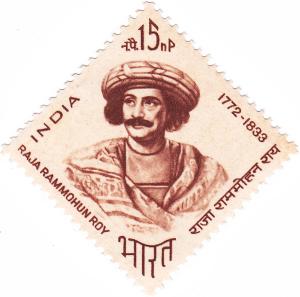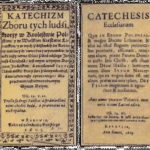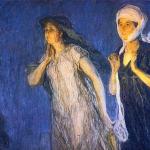
Ram Mohan Roy
in front of the
Bristol Cathedral
Ram Mohan Roy (also spelled Rammohan Roy) was born in Radhanagar, Bengal, on the 22nd of April, in 1772.
A towering intellect, seeker of justice, and religious reformer, Roy deserves to be more widely known outside of India. He is generally credited as coining the term “Hinduism” as an overall term for the family of religions on the Indian subcontinent. Frankly for that alone…
Roy has been called the Father of the Bengali Renaissance, an amazing cultural, religious, intellectual, and artistic era that began with him and continued into the twentieth century. He was an advocate for women’s rights best known as a fierce opponent of sati the practice of “suicide” by widows, called for a major reform of the caste system, as well as inspiring and leading a call to a Unitarian-inspired reform of Hinduism.
His biographical article at the UUA notes Roy “promoted a rational, ethical, non-authoritarian, this-worldly, and social-reform Hinduism. Thus he has been called the “Father of Modern India.” His writings sparked interest among British and American Unitarians, inspired Unitarian missionary work in India, and influenced the Transcendentalists.”
Roy was a founder of the Calcutta Unitarian Society as well as the Brahmo Samaj.

The Brahmo Samaj was one of the organizations that has an influence well beyond the mere number of its adherents. The name implies the company of God. It was founded in 1828 by Roy and Dwarkanath Tagore (grandfather of Nobel lauriat Rabindranath Tagore). And two years later they launched a first house of prayer.
Signal features of the Brahmo are setting reason above all scriptures, denial of literal avatars, rejecting polytheism, rejecting the caste system, and taking an officially agnostic stance on karma and reincarnation. Over time the group would suffer several schisms, and today there are three institutions that claim a direct lineage, the Brahmo Samaj, Adi Brahom Samaj, and the Sadharan Brahmo Samaj.
At their peak they may have had as many as eight million members. But their numbers have collapsed in modernity and today count about twenty thousand. Again, these numbers bely the pervasive influence of their teachings and that of Ram Mohan Roy.
When he died the great American Unitarian minister William Ellery Channing wrote, “I feel his loss deeply. I cannot name a stranger whom I so wished to see.” The UUA biography informs us “Roy’s poetic English translations of Vedic literature later fired the oracular imaginations of Ralph Waldo Emerson and Henry David Thoreau. His greatest legacy was the dream of a universal religion based on the belief of a Divine Unity. Rabindranath Tagore declared that Roy ‘realized that a bond of spiritual unity links the whole of mankind.'”
An amazing person.
Deserving a more prominent place in our minds and hearts.













